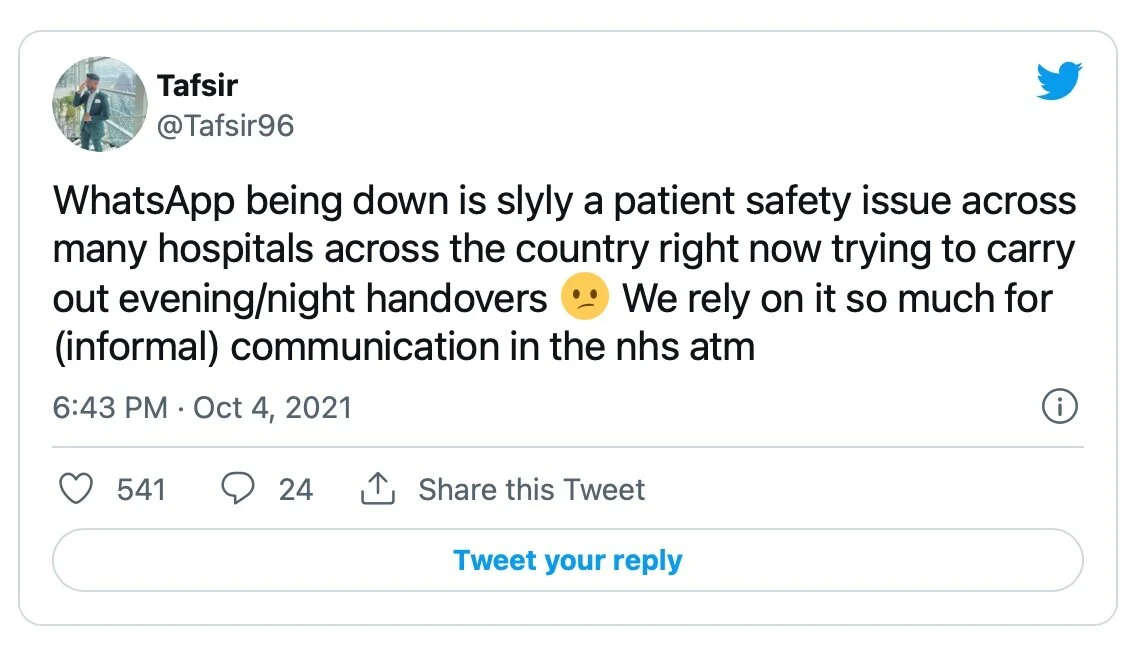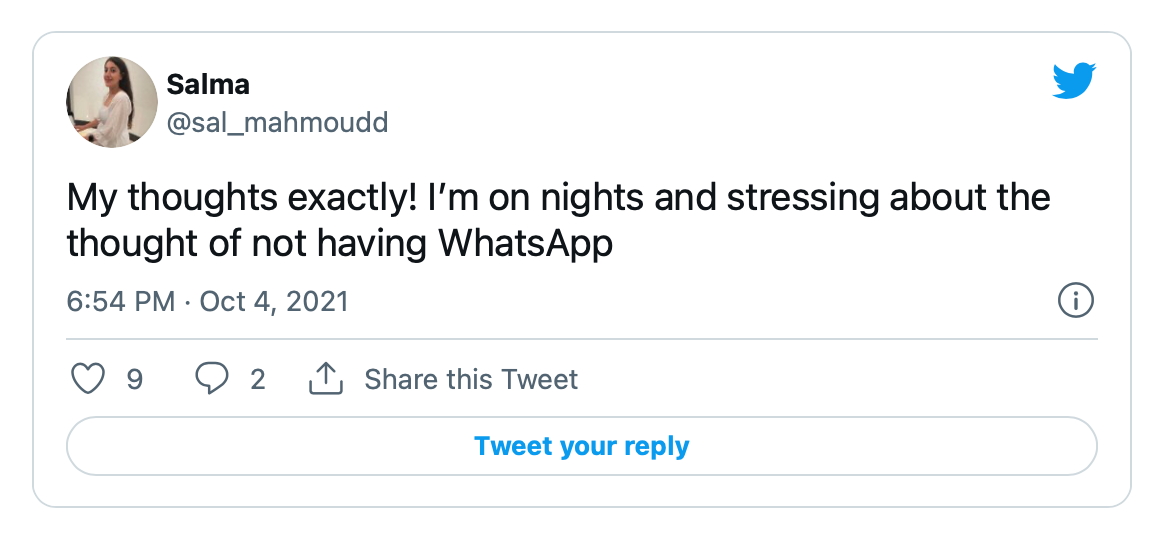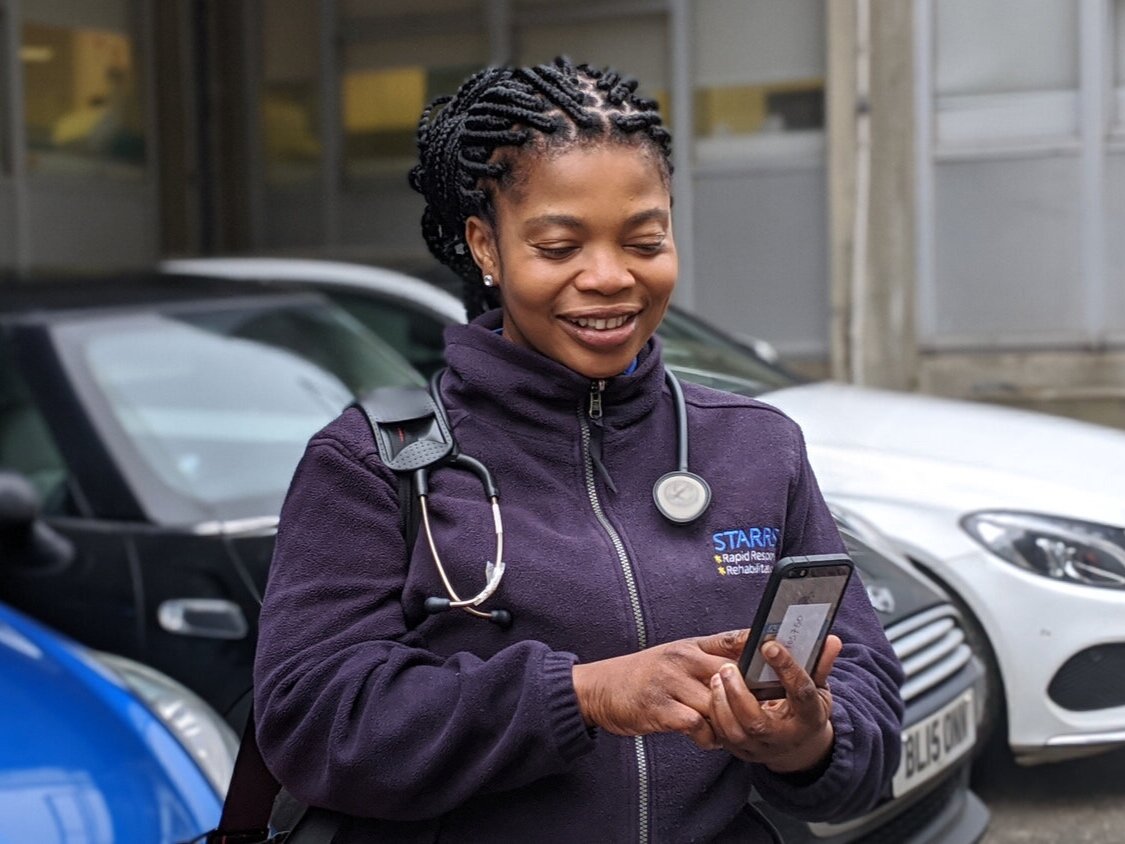WhatsApp being down doesn’t have to be a patient safety issue
By Dr Jo Garland
This week, WhatsApp, Facebook and Instagram went down for several hours, causing a global furore. Thousands of users took to Twitter to share their experiences of having their favourite social networks unavailable, but one particular tweet from an NHS doctor revealed the serious and potentially dangerous consequences of losing WhatsApp for just a few hours.
What’s WhatsApp got to do with patient safety?
Those of us with a medical background are well aware of the pitfalls of using WhatsApp in healthcare, not least the risk of breaching data protection laws if patient identifiable data is shared. However, current health and care communications systems like bleeps and phone calls are not always convenient and can slow things down, so staff may use WhatsApp to share information without disclosing exactly who the patient is. This carries the risk of creating confusion around which patient is being referred to when discussing treatment or care needs, which could have serious consequences.
On top of all this, users have no way of knowing if their WhatsApp message was even seen by the right person, let alone acted upon, and most trusts don't know who is using it and what they are using it for. WhatsApp is not auditable in the case where a chain of events is being investigated.
Despite these issues, NHS staff are using WhatsApp to share information, and will continue to do so whilst the tools they have available to them do not meet their needs. Regardless of the communication tool used, I know from experience that staff often add information gathered to a paper “to-do” list, which they carry around throughout their shift, adding items as they go. This has many safety and information security risks, and again is not auditable or trackable by anyone but the person with it in their hand.
The alternative isn’t just more messaging
Understandably, some people are calling for all NHS staff to upgrade from WhatsApp to compliant messaging apps designed specifically for healthcare, however I do not feel this is the whole answer to the problem.
Tasks or requests communicated through an instant messaging tool are almost always added by hand to one or more paper lists that staff carry in their pockets during their shift. It’s a workaround, which helps to support the outdated and unsafe practice of managing health and care tasks using paper, whiteboards, or sometimes spreadsheets.
It is my view, and the view of Infinity Health, that the real issue is a lack of a shared, real-time repository of information about patients and the tasks required to treat and care for them. A “digital to-do” list which shows all patients within a service, that relevant multidisciplinary staff can access and add to at any time.
A safer way to keep track of patient care
If health and care staff had a real-time patient and task list that they could access and update from anywhere for their colleagues to see, they wouldn't need to rely so heavily on instant messages to get and share the information they need. They wouldn’t need to message about Patient A on Ward 3 needing Y treatment within a certain timeframe hope that their request was seen by the right person, written down, and actioned. They’d be able to add the task to the digital list, assign it to an individual or role, and see when it had been accepted, started, and completed. Likewise, they could be allocated tasks to their own list and mark their progress for others to track. This also allows senior staff to have activity of their team and support them.
With a digital task management platform like Infinity, handover would be safer and nothing would be missed. WhatsApp being down wouldn't pose a patient safety risk and staff wouldn't need to feel this anxious about it. It would also reduce the need for non-emergency bleeps, something that Somerset NHS Foundation Trust are rolling out across their adult inpatient services, beginning in the out of hours team, and would reduce the need for more instant messaging.
What if this goes down, too?
No system is immune to downtime - including Infinity - but unlike WhatsApp users, we have a support agreement in place with our customers, so would be notified if an issue was identified and would maintain communication whilst we worked on a fix. WhatsApp simply can't offer this... and let's be honest, as I have outlined above, using an instant messaging app to try and coordinate handover and care is potentially unsafe anyway.
In parallel, in the event of unscheduled downtime, customers cut-over to their business continuity plan, which is to use a spreadsheet backed up automatically every few minutes direct from Infinity; they would have an up-to-date list of all patients and outstanding tasks that they can use. If the only thing staff had was a messaging app, the best they could do would be to store some sort of archive of all recent messages. Someone would then need to manually go through everything to work out what had hadn't been done.
Is there still a role for WhatsApp in healthcare?
Of course, there will always be a role for some form of instant messaging in healthcare (where else to share telling colleagues about meetings or events?), but I believe a large proportion of communication in healthcare environments would benefit from a move towards truly digital task management. Like instant messaging, digital task management happens in real-time and is instantly accessible by relevant staff wherever they are, but it is auditable, trackable, and safer; nothing gets missed.
Technology is now more mature, more sophisticated, and capable of so much more than sharing free-form text, that now is surely the time to re-look at messaging in healthcare.
About the Author
Dr Jo Garland
Dr Jo Garland worked as a General Practitioner in North West London for several years, before making the move into NHS training and facilitation and then healthtech.
Jo believes that staff need the right tools to manage their everyday workload, and focuses on how technology can reduce the administrative burden and allow more time to care. She is passionate about joining-up care between primary, secondary, and community care within the NHS.
At Infinity, Jo’s primary goal is to work with healthcare professionals to understand their current efficiency challenges, and support the roll-out of our digital solution to solve them.
Prior to joining Infinity, Jo led health coaching programmes for patients with long-term conditions, working to reduce inappropriate A&E admissions. She also previously worked on the nationally-funded NHS Right Care Shared Decision-Making Programme, facilitating the production of patient decision aids.







